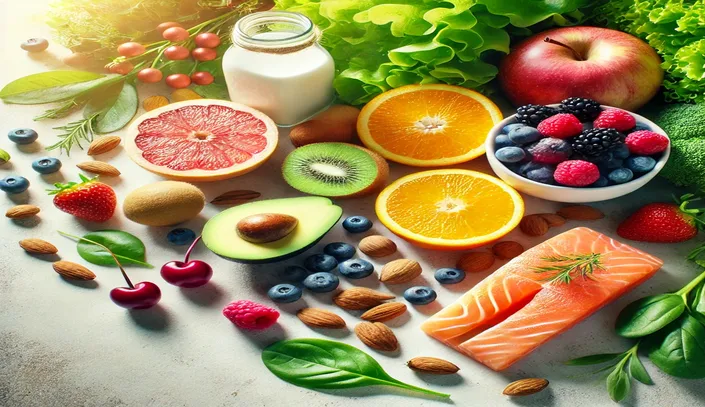Physical Address
304 North Cardinal St.
Dorchester Center, MA 02124
Physical Address
304 North Cardinal St.
Dorchester Center, MA 02124

When we think about skin health, many of us immediately turn to skincare products or treatments. But have you ever wondered how your diet plays a crucial role in the appearance and health of your skin? The truth is, what we eat can significantly influence the way our skin looks and feels. In this post, we’ll explore the powerful connection between diet and skin health, highlighting foods that promote a glowing complexion and those that can lead to skin issues.
Your skin is the body’s largest organ, and just like any other organ, it needs proper nourishment to function optimally. Vitamins, minerals, antioxidants, and healthy fats found in certain foods can protect the skin from damage, support its natural processes, and keep it looking youthful. A well-balanced diet filled with nutrient-rich foods can help reduce inflammation, prevent premature aging, and promote skin elasticity.
Antioxidants are crucial for protecting your skin from oxidative stress caused by free radicals, which can accelerate aging and damage skin cells. Incorporating antioxidant-rich foods like berries (blueberries, strawberries, raspberries), dark chocolate (70% cocoa or higher), and leafy greens (spinach, kale) into your diet can help combat free radical damage and keep your skin looking vibrant.
Healthy fats, particularly those rich in omega-3 fatty acids, are essential for maintaining a hydrated and supple complexion. Foods like avocados, walnuts, flaxseeds, and fatty fish (salmon, mackerel, sardines) provide these essential fats, which help maintain your skin’s natural barrier and retain moisture.
Vitamin C is a potent antioxidant that plays a vital role in collagen production, helping your skin maintain its firmness and elasticity. Additionally, it helps brighten the skin and even out skin tone. To boost your vitamin C intake, include foods like citrus fruits (oranges, grapefruits), bell peppers, broccoli, and tomatoes in your meals.
Zinc is known for its role in healing and skin regeneration. It also helps reduce inflammation and regulate oil production, which is especially beneficial for those with acne-prone skin. Zinc-rich foods include nuts, seeds (especially pumpkin seeds), beans, chickpeas, and whole grains.
While sugar might satisfy your sweet tooth, it can also cause a spike in insulin levels, which triggers inflammation and can contribute to acne outbreaks. Excessive sugar can also accelerate the breakdown of collagen and elastin, leading to premature wrinkles. To maintain healthy skin, it’s best to limit processed sugars and refined carbohydrates.
Some studies suggest that dairy products, particularly milk, may be linked to acne flare-ups in certain individuals. Dairy can increase insulin levels and influence hormone production, which may trigger skin inflammation. While not everyone is affected by dairy, if you struggle with acne, it may be worth cutting back on milk and cheese to see if your skin improves.
Processed foods and those high in trans fats and unhealthy oils can contribute to inflammation in the body, which can show up on your skin in the form of redness, puffiness, and acne. Cutting back on fast food, fried snacks, and packaged meals can help reduce inflammation and improve overall skin health.
Staying hydrated is one of the simplest but most powerful ways to support your skin’s health. Water helps flush out toxins, maintain skin elasticity, and prevent dryness. Aim to drink at least 8 glasses of water a day, and consider adding hydrating foods like cucumbers, watermelon, and celery to your diet to boost your skin’s moisture levels.
Did you know that your gut health directly affects your skin? A balanced gut microbiome helps regulate inflammation and supports the body’s ability to absorb nutrients that are essential for skin health. A diet rich in fiber, prebiotics, and probiotics (found in foods like yogurt, kefir, and fermented vegetables) can promote a healthy gut, which may, in turn, improve the appearance of your skin.
It’s important to remember that no single food or supplement can magically transform your skin. Skin health is a result of an overall balanced diet, a consistent skincare routine, and lifestyle habits like adequate sleep and stress management. Rather than focusing on short-term fixes, aim to adopt a long-term approach to nourishing your body from the inside out.
The connection between diet and skin health is undeniable. By focusing on nutrient-rich foods like antioxidants, healthy fats, and vitamins, you can enhance your skin’s appearance and fight off issues like acne, dryness, and premature aging. Equally important is avoiding foods that contribute to inflammation and skin damage, such as excessive sugar and processed foods. Remember, glowing skin starts with what you put on your plate.
By making mindful dietary choices and adopting a holistic approach to skincare, you’ll be well on your way to radiant, healthy skin that truly shines.